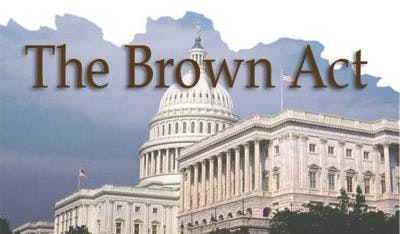Alternatives to Brown Act Gives Public Agencies Flexibility
For more than two years now the global pandemic that started with COVID-19 affected practically every facet of life including public board meetings of governmental agencies, like the Board of Directors meetings conducted by the Antelope Valley-East Kern Water Agency.
Attendance of those meetings occurred remotely, with the public and even Board members either using Zoom for a video conference or teleconferencing via phone to participate.
In addition to the new way of conducting board meetings, the pandemic caused a change to California’s nearly 70-year-old Ralph M. Brown Act, the 1953 law which guarantees the public’s right to attend and participate in those meetings. James Markman, AVEK’s General Counsel, informed the board of alternatives to the Brown Act at their meeting on November 22, 2022.
Those alternatives were intended to give agencies more flexibility in meeting formats.

Assembly Bill 2449 provides alternate authority for members of a local agency legislative body to participate in public meetings via teleconference in certain limited circumstances. The authorization is separate from the traditional Brown Act teleconferencing provisions. It is also separate from the relaxed teleconferencing provisions established by Assembly Bill 361, approved in 2021 for declared emergencies.
Provisions of AB 2449 are effective for three years, starting January 1, 2023, and ending January 1, 2026.
Except for specific conditions, the traditional Brown Act requires all meetings of the legislative body for a local agency to be open so all members of the public can attend and participate. Under the Brown act, meetings can occur via teleconferencing based on certain requirements: the agency must identify the teleconference location of each board member that will be participating in the meeting; each teleconference location must be accessible to the public; members of the public must be allowed to address the board at each teleconference location; the meeting agenda must be posted at each teleconference location; and at least a quorum of the board must participate from locations within boundaries of the agency’s jurisdiction. For AVEK, that means four directors out of seven.
AB 361 was adopted as urgency legislation in 2021 and is effective until January 1, 2024. It amended the Brown Act to relax teleconference requirements during Governor-proclaimed emergencies. Relaxed requirements apply when either state or local officials impose or recommend measures to promote social distancing, or when the agency determines the emergency meeting would cause imminent risks to the health or safety of people in attendance.
AB 361 allows the board to meet via teleconference without a quorum of members physically present and without having to post agendas at all teleconference locations or without identifying each teleconference location. Also, under AB 361 each teleconference location does not have to be accessible to the public. To use these provisions, the legislative body must assess the required conditions every 30 days. In other words, monthly they must determine whether the declared emergency conditions still exist.
AB 2449 provides local agency legislative bodies with an additional, but still limited, teleconferencing option starting on January 1, 2023.
It’s an attempt to give agencies even greater flexibility when conducting meetings through a teleconference. Although it shares some similarities with AB 361, a significant difference requites the board to have physical meeting places.
What it has in common with AB 361 is the fact that it does not require agencies to post agendas at all the teleconference locations and it is not necessary to identify all teleconference locations in the meeting agenda. Also, it is not required to make each teleconference location open to the public.
But, agencies meeting via a teleconference must follow certain requirements informing the public that a remote meeting is taking place and it must describe the way that members of the public can access the meeting and give their comments. So there must be a call-in option or Internet-based service option, such as Zoom, for members of the public to participate in the meeting.
If a disruption occurs that prevents members of the public from providing their comments through the call-in or Internet service systems, the board must cease all action on agenda items until service can be restored for the public. Additionally, the board cannot require public comments to be submitted prior to the meeting.
Various other details to the Brown Act meeting alternatives can be found by reading the text of California AB 2449 and California AB 361.
Attorney Markman told AVEK directors that as of January 1, 2023, they can choose to follow rules of the Brown Act or decide to go with the new alternative guidelines.
“The Brown Act is the easiest to keep doing,” he noted, adding, “it’s up to you.”

